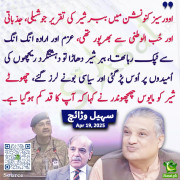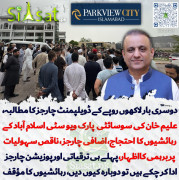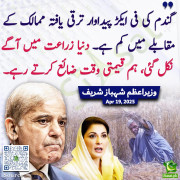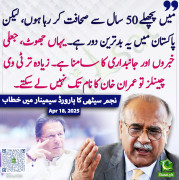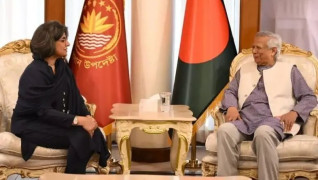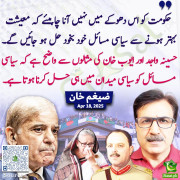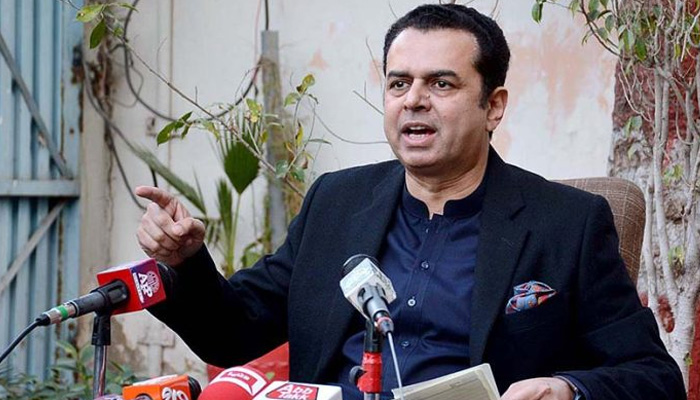- Featured Thumbs
- https://i.ytimg.com/vi/_6NLrb2xinA/maxresdefault.jpg
You are using an out of date browser. It may not display this or other websites correctly.
You should upgrade or use an alternative browser.
You should upgrade or use an alternative browser.
People who only follow Quran and reject hadiths & sunnah - Apostates?
- Thread starter FORCE
- Start date
Wake up Pak
(50k+ posts) بابائے فورم
This bearded goat pathetic imbecile mullah calls a person who does not follow the Ahadith an apostate or Kaafir. Anyone who follows a man-made book other than the Quran is not adhering to its teachings.
observer-x
observer-x
Last edited:
jigrot
Minister (2k+ posts)
In the discourse of Islamic theology, the question of Hadith authenticity and its role in defining one’s faith often arises. While it is imperative to approach such discussions with deep reverence and scholarly integrity, it is equally important to ensure that our conclusions are rooted in the primary principles of Islam and guided by intellectual honesty. This essay seeks to address the concerns surrounding the rejection of Hadith and whether such a stance disqualifies one from the fold of Islam.
The Core Tenets of Islam
To be recognized as a Muslim, one must affirm the foundational pillars of faith. The essential declaration of Islam, the Shahadah, encapsulates the following testimony: “Ashhadu an la ilaha illa Allah, wa ashhadu anna Muhammadur Rasul Allah” — “I bear witness that there is no god but Allah, and I bear witness that Muhammad is the Messenger of Allah.” This declaration represents the core entry point into the Islamic faith.
Belief in Allah, His angels, His revealed books, His messengers, the Day of Judgment, and divine decree, as outlined in the Qur'an (Surah Al-Baqarah 2:285), are the principles that define one's Iman (faith). Thus, a Muslim is someone who affirms these pillars — not necessarily someone who agrees with every scholarly interpretation or classification of secondary sources.
The Status and Authority of Hadith
The Hadith literature — sayings, actions, and approvals of the Prophet Muhammad (peace be upon him) — is of paramount importance in Islamic tradition. It serves as an explanation of the Qur'an, provides context to legislation, and offers practical examples of the Prophet’s exemplary character.
However, it must be recognized that unlike the Qur'an, which is the verbatim word of Allah and preserved in its original form, the Hadith corpus has been transmitted through human narrators. This introduces the element of scrutiny and scholarly effort in the authentication process.
The science of Hadith (‘Ilm al-Hadith) is one of the most sophisticated systems of verification ever developed. Scholars such as Imam Bukhari, Imam Muslim, and many others applied rigorous criteria to determine the authenticity of narrations. Consequently, Hadith are categorized as Sahih (authentic), Hasan (good), Da’if (weak), and Mawdu‘ (fabricated).
Rejecting Weak Hadith Is Not Rejecting Islam
It is a mischaracterization to claim that someone who questions or rejects a weak Hadith is necessarily rejecting the Sunnah or the Prophet himself. Rejecting a Hadith after scholarly investigation, especially if it is classified as weak (Da’if) or unauthentic, is in line with the methodology of classical scholars. It is not an act of disbelief but rather an act of caution and due diligence.
Throughout Islamic history, scholars have disagreed on the authenticity of certain Hadith without accusing each other of apostasy. Even among the most revered jurists and theologians, differing opinions on specific narrations are found. Thus, making a blanket statement that “whoever rejects Hadith is not a Muslim” is both unjust and theologically unsound.
It is crucial to differentiate between rejecting the entire Sunnah — which is a serious matter and could constitute deviation — and the legitimate scholarly critique of individual narrations. The former implies a denial of the Prophethood itself, while the latter is a recognized part of Islamic scholarly tradition.
The Role of Man-Made Books and Interpretations
There are many contemporary writings and books that analyze Islamic teachings, offer interpretations, or propose modern applications. While some of these works are insightful and beneficial, it is essential to distinguish between divine guidance and human interpretation. To become a Muslim, one is not required to accept the content of any man-made book. Rather, the commitment is to the Qur'an and the authentic teachings of the Prophet.
Blindly accepting every human interpretation — even those written in the name of Islam — is not a requirement of faith. On the contrary, the Qur'an invites believers to reflect, think, and seek knowledge. It is within this spirit that Muslims are encouraged to critically examine what they read, always returning to the Qur’an and authentic Sunnah for guidance.
Conclusion
In summary, to be a Muslim is to accept the oneness of Allah and the Prophethood of Muhammad (peace be upon him). While belief in the Prophet entails respect and reverence for his teachings, it does not necessitate unconditional acceptance of every narration labeled as Hadith without scrutiny. The science of Hadith itself allows — and indeed requires — critical evaluation of authenticity.
Therefore, rejecting a Hadith based on sound scholarly research, particularly if it is weak or fabricated, is not equivalent to rejecting Islam. Let us be cautious not to make sweeping declarations about the faith of others without proper understanding, and let us approach all matters of religion with wisdom, knowledge, and humility.
Last edited:
Wake up Pak
(50k+ posts) بابائے فورم
[6:114] Shall I seek other than GOD as a source of law, when He has revealed to you this book fully detailed?* Those who received the scripture recognize that it has been revealed from your Lord, truthfully. You shall not harbor any doubt.
[6:115] The word of your Lord is complete,* in truth and justice. Nothing shall abrogate His words. He is the Hearer, the Omniscient.
6:116] If you obey the majority of people on earth, they will divert you from the path of GOD. They follow only conjecture; they only guess.
Upholding any source besides the Quran reflects disbelief in the Quran.
[6:115] The word of your Lord is complete,* in truth and justice. Nothing shall abrogate His words. He is the Hearer, the Omniscient.
6:116] If you obey the majority of people on earth, they will divert you from the path of GOD. They follow only conjecture; they only guess.
Upholding any source besides the Quran reflects disbelief in the Quran.
jigrot
Minister (2k+ posts)
Misuse of Hadith and Misinterpretation of the Qur’an: A Cautionary ReflectionThis bearded goat pathetic imbecile mullah calls a person who does not follow the Ahadith an apostate or Kaafir. Anyone who follows a man-made book other than the Quran is not adhering to its teachings.
observer-x
In every generation, Islam has faced challenges not only from external forces but also from internal misuse and misrepresentation. One of the most concerning trends in our time is the exploitation of weak Hadith and selective interpretations of the Qur’an to promote personal agendas, create division, or justify harmful ideologies.
The Qur’an is the final and perfect word of Allah, and the Hadith — the sayings and actions of the Prophet Muhammad (peace be upon him) — serve as a vital source to understand and implement its guidance. However, the authenticity of Hadith has always been a serious matter. Our scholars, through the science of Hadith criticism (‘Ilm al-Jarh wa al-Ta'dil), have categorized narrations based on the reliability of their chains and content. Weak or fabricated Hadith were never meant to be used in forming legal rulings or theological doctrines. Unfortunately, some individuals overlook this careful scholarship and weaponize weak or isolated narrations for personal or political gain.
Likewise, misinterpreting the Qur’an — by ignoring context, linguistic nuance, or the holistic message — can lead to misguided conclusions. This selective reading often ignores the centuries of tafsir (exegesis) developed by scholars grounded in knowledge and sincerity.
The danger of such misuse is not limited to academic error. It can fracture communities, spread misinformation, and tarnish the beauty and balance of our religion. True scholarship in Islam demands responsibility, humility, and a commitment to truth — not the manipulation of sacred texts for self-serving ends.
As Muslims, we must return to the tradition of sound scholarship, critical thinking, and sincere intention. Only then can we preserve the unity and integrity of our Ummah and uphold the noble teachings of Islam in their rightful form.
Wake up Pak
(50k+ posts) بابائے فورم
[Quran 6:19] Say, "Whose testimony is the greatest?" Say, "God's. He is the witness between me and you that this Quran has been inspired to me, to preach it to you and whomever it reaches. Indeed, you bear witness that there are other gods beside God." Say, "I do not testify as you do; there is only one god, and I disown your idolatry."
[Quran 6:38] We did not leave anything out of this book.
[Quran 7:52] We have given them a scripture that is fully detailed, with knowledge, guidance, and mercy for the people who believe.
[Quran 10:37] This Quran could not possibly be authored by other than God. It confirms all previous messages, and provides a fully detailed scripture. It is infallible, for it comes from the Lord of the universe.
[Quran 12:111] In their history, there is a lesson for those who possess intelligence. This is not fabricated Hadith; this (Quran) confirms all previous scriptures, provides the details of everything, and is a beacon and mercy for those who believe.
[Quran 6:38] We did not leave anything out of this book.
[Quran 7:52] We have given them a scripture that is fully detailed, with knowledge, guidance, and mercy for the people who believe.
[Quran 10:37] This Quran could not possibly be authored by other than God. It confirms all previous messages, and provides a fully detailed scripture. It is infallible, for it comes from the Lord of the universe.
[Quran 12:111] In their history, there is a lesson for those who possess intelligence. This is not fabricated Hadith; this (Quran) confirms all previous scriptures, provides the details of everything, and is a beacon and mercy for those who believe.
Wake up Pak
(50k+ posts) بابائے فورم
[Quran 6:19] Say, "Whose testimony is the greatest?" Say, "God's. He is the witness between me and you that this Quran has been inspired to me, to preach it to you and whomever it reaches. Indeed, you bear witness that there are other gods beside God." Say, "I do not testify as you do; there is only one god, and I disown your idolatry."Misuse of Hadith and Misinterpretation of the Qur’an: A Cautionary Reflection
In every generation, Islam has faced challenges not only from external forces but also from internal misuse and misrepresentation. One of the most concerning trends in our time is the exploitation of weak Hadith and selective interpretations of the Qur’an to promote personal agendas, create division, or justify harmful ideologies.
The Qur’an is the final and perfect word of Allah, and the Hadith — the sayings and actions of the Prophet Muhammad (peace be upon him) — serve as a vital source to understand and implement its guidance. However, the authenticity of Hadith has always been a serious matter. Our scholars, through the science of Hadith criticism (‘Ilm al-Jarh wa al-Ta'dil), have categorized narrations based on the reliability of their chains and content. Weak or fabricated Hadith were never meant to be used in forming legal rulings or theological doctrines. Unfortunately, some individuals overlook this careful scholarship and weaponize weak or isolated narrations for personal or political gain.
Likewise, misinterpreting the Qur’an — by ignoring context, linguistic nuance, or the holistic message — can lead to misguided conclusions. This selective reading often ignores the centuries of tafsir (exegesis) developed by scholars grounded in knowledge and sincerity.
The danger of such misuse is not limited to academic error. It can fracture communities, spread misinformation, and tarnish the beauty and balance of our religion. True scholarship in Islam demands responsibility, humility, and a commitment to truth — not the manipulation of sacred texts for self-serving ends.
As Muslims, we must return to the tradition of sound scholarship, critical thinking, and sincere intention. Only then can we preserve the unity and integrity of our Ummah and uphold the noble teachings of Islam in their rightful form.
[Quran 6:38] We did not leave anything out of this book.
[Quran 7:52] We have given them a scripture that is fully detailed, with knowledge, guidance, and mercy for the people who believe.
[Quran 10:37] This Quran could not possibly be authored by other than God. It confirms all previous messages, and provides a fully detailed scripture. It is infallible, for it comes from the Lord of the universe.
[Quran 12:111] In their history, there is a lesson for those who possess intelligence. This is not fabricated Hadith; this (Quran) confirms all previous scriptures, provides the details of everything, and is a beacon and mercy for those who believe.
Wake up Pak
(50k+ posts) بابائے فورم
There is no Shahada in the Quran where you associate Allah with the Messenger.To be recognized as a Muslim, one must affirm the foundational pillars of faith. The essential declaration of Islam, the Shahadah, encapsulates the following testimony: “Ashhadu an la ilaha illa Allah, wa ashhadu anna Muhammadur Rasul Allah” — “I bear witness that there is no god but Allah, and I bear witness that Muhammad is the Messenger of Allah.” This declaration represents the core entry point into the Islamic faith.
You do not need Shahada to enter Islam. All man-made stuff, you should refrain from.
Wake up Pak
(50k+ posts) بابائے فورم
jigrot
Minister (2k+ posts)
[6:114] Shall I seek other than GOD as a source of law, when He has revealed to you this book fully detailed?* Those who received the scripture recognize that it has been revealed from your Lord, truthfully. You shall not harbor any doubt.
[6:115] The word of your Lord is complete,* in truth and justice. Nothing shall abrogate His words. He is the Hearer, the Omniscient.
6:116] If you obey the majority of people on earth, they will divert you from the path of GOD. They follow only conjecture; they only guess.
Upholding any source besides the Quran reflects disbelief in the Quran.
The Importance of Hadith: The Living Explanation of the Qur'an
In Islam, the Qur'an is the final, preserved, and complete word of Allah. It is the foundation of our faith, the ultimate source of guidance, and the light that leads the believer through every aspect of life. As Muslims, we turn to the Qur'an for everything — for our beliefs, our values, our laws, and our spiritual nourishment. It is, without a doubt, the Book of Truth.
However, while the Qur'an is perfect and sufficient, its wisdom is deep, and at times, its philosophy can be complex to fully grasp. This is where the Hadith — the sayings, actions, and approvals of the Prophet Muhammad (peace be upon him) — serve an essential role. The Prophet’s life is the actionable form of the Qur'an. His behavior, decisions, and words are the living tafsir (exegesis) of the divine message.
Allah Himself in the Qur’an declares:
"Indeed, in the Messenger of Allah you have a beautiful example to follow..." (Surah Al-Ahzab 33:21)
This verse clearly establishes that the Prophet is not only a messenger but also a model for how the Qur’an is to be practiced in daily life. Without Hadith, how would we fully understand how to pray, fast, give zakat, or perform Hajj? These pillars are mentioned in the Qur’an, but their details — timing, method, conditions — are taught through the Prophet’s example.
Furthermore, Hadith provides context to many Qur’anic verses. Without knowing when and why certain verses were revealed (Asbab al-Nuzul), one might misinterpret their meaning or miss the depth of their guidance. The Prophet’s Sunnah helps ensure that our understanding of the Qur’an is correct, practical, and consistent with the spirit of Islam.
It is also important to recognize that Hadith complements the Qur’an — it does not compete with it. A sound Hadith will never contradict the Qur’an; rather, it helps explain and implement it. This is why the companions of the Prophet, and generations of scholars after them, always treated the Sunnah as a vital part of Islamic knowledge.
In conclusion, while the Qur’an is the central source of guidance for all Muslims, the Hadith plays a critical role in helping us understand and live by it. The Prophet Muhammad (peace be upon him) was the walking Qur’an — his life was a mirror of divine revelation. To follow the Qur’an properly, we must study the Hadith with care, respect, and a sincere heart — not to replace the Qur’an, but to be guided in how to apply it.
Wake up Pak
(50k+ posts) بابائے فورم
It means that you are denying the verses of the Quran that it is complete and detailed.However, while the Qur'an is perfect and sufficient, its wisdom is deep, and at times, its philosophy can be complex to fully grasp. This is where the Hadith — the sayings, actions, and approvals of the Prophet Muhammad (peace be upon him) — serve an essential role. The Prophet’s life is the actionable form of the Qur'an. His behavior, decisions, and words are the living tafsir (exegesis) of the divine message.
Do you think that these Ahadith can explain the Quran?
Wake up Pak
(50k+ posts) بابائے فورم
Provide any verse from the Quran that we have to follow the ahadith written some 200+ years after the demise of the Messenger.The Importance of Hadith: The Living Explanation of the Qur'an
In Islam, the Qur'an is the final, preserved, and complete word of Allah. It is the foundation of our faith, the ultimate source of guidance, and the light that leads the believer through every aspect of life. As Muslims, we turn to the Qur'an for everything — for our beliefs, our values, our laws, and our spiritual nourishment. It is, without a doubt, the Book of Truth.
However, while the Qur'an is perfect and sufficient, its wisdom is deep, and at times, its philosophy can be complex to fully grasp. This is where the Hadith — the sayings, actions, and approvals of the Prophet Muhammad (peace be upon him) — serve an essential role. The Prophet’s life is the actionable form of the Qur'an. His behavior, decisions, and words are the living tafsir (exegesis) of the divine message.
Allah Himself in the Qur’an declares:
"Indeed, in the Messenger of Allah you have a beautiful example to follow..." (Surah Al-Ahzab 33:21)
This verse clearly establishes that the Prophet is not only a messenger but also a model for how the Qur’an is to be practiced in daily life. Without Hadith, how would we fully understand how to pray, fast, give zakat, or perform Hajj? These pillars are mentioned in the Qur’an, but their details — timing, method, conditions — are taught through the Prophet’s example.
Furthermore, Hadith provides context to many Qur’anic verses. Without knowing when and why certain verses were revealed (Asbab al-Nuzul), one might misinterpret their meaning or miss the depth of their guidance. The Prophet’s Sunnah helps ensure that our understanding of the Qur’an is correct, practical, and consistent with the spirit of Islam.
It is also important to recognize that Hadith complements the Qur’an — it does not compete with it. A sound Hadith will never contradict the Qur’an; rather, it helps explain and implement it. This is why the companions of the Prophet, and generations of scholars after them, always treated the Sunnah as a vital part of Islamic knowledge.
In conclusion, while the Qur’an is the central source of guidance for all Muslims, the Hadith plays a critical role in helping us understand and live by it. The Prophet Muhammad (peace be upon him) was the walking Qur’an — his life was a mirror of divine revelation. To follow the Qur’an properly, we must study the Hadith with care, respect, and a sincere heart — not to replace the Qur’an, but to be guided in how to apply it.
jigrot
Minister (2k+ posts)
I understand that different people may approach faith in their own way, but from my perspective — and according to the teachings of mainstream Islam — saying the Shahada is essential. It’s not just a formality; it’s a powerful declaration that connects us to the very core of our faith: belief in the Oneness of Allah and the finality of Prophet Muhammad (peace be upon him).There is no Shahada in the Quran where you associate Allah with the Messenger.
You do not need Shahada to enter Islam. All man-made stuff, you should refrain from.
So, if someone doesn’t say the Shahada, they may still believe in God, and they might identify as a Muslim in their own understanding. But they wouldn’t be considered a Muslim in the traditional sense that I follow — the one based on the Qur’an, the Sunnah, and the consensus of generations of scholars.
The Shahada is more than words — it’s the doorway into the shared faith and unity of the Muslim Ummah.
jigrot
Minister (2k+ posts)
Can you explain the Quran without Ahadith??It means that you are denying the verses of the Quran that it is complete and detailed.
Do you think that these Ahadith can explain the Quran?
Citizen X
(50k+ posts) بابائے فورم
Now I know why people like oBozo-x act the way they do, they have learnt it from their bhaand moulvis. This mushrik comedian automatically assumes that people who reject their fairytales have never read the Quran. When its quite the opposite not only they know the Quran better than most mushriks but their hadith better than their blind hadith followers.
And that he 100% liar, just recently his talk with Sneako went viral where he says if you not reject or believe, just have a doubt in any "sahih" hadith no matter how ridiculous you think it is, you are straight away a kaffir, his exact words were "You're full fledged kaffir, get out of my house"
While in this video he's saying the total opposite.
This Assim al ghabbi really is a comedian and I feel sorry for people who waste $220 to listen to his garbage for an hour
jigrot
Minister (2k+ posts)
Allah Himself in the Qur’an declares:Provide any verse from the Quran that we have to follow the ahadith written some 200+ years after the demise of the Messenger.
"Indeed, in the Messenger of Allah you have a beautiful example to follow..." (Surah Al-Ahzab 33:21)
jigrot
Minister (2k+ posts)
Qur’anic Foundation of the ShahadaThere is no Shahada in the Quran where you associate Allah with the Messenger.
You do not need Shahada to enter Islam. All man-made stuff, you should refrain from.
Though the exact wording of the Shahada is not presented in one single verse, its components are clearly established throughout the Qur’an:
Tawheed is affirmed repeatedly:
“La ilaha illa Huwa” – “There is no deity except Him” (Surah Al-Baqarah 2:255, Ayat al-Kursi).
The Messenger’s role is likewise affirmed:
“Muhammad is the Messenger of Allah...” (Surah Al-Fath 48:29)
“Obey Allah and obey the Messenger...” (Surah An-Nisa 4:59)
The Qur’an emphasizes both belief in Allah and belief in His Messenger. To deny either is to fall short of complete faith. Therefore, the Shahada simply brings together these two essential beliefs in one declaration.
Citizen X
(50k+ posts) بابائے فورم
Where did this shahda come from? Its no where in the Quran? The ayah you qoutes, yes says this is what you have to believe in to be a Muslim but then added your own ( or rather from who ever you copy and pasted this from ) addition that one has to verbally affirm this. And since the Quran says you have to believe in all his messengers and all messengers are equal then your sahada should be.The Core Tenets of Islam
To be recognized as a Muslim, one must affirm the foundational pillars of faith. The essential declaration of Islam, the Shahadah, encapsulates the following testimony: “Ashhadu an la ilaha illa Allah, wa ashhadu anna Muhammadur Rasul Allah” — “I bear witness that there is no god but Allah, and I bear witness that Muhammad is the Messenger of Allah.” This declaration represents the core entry point into the Islamic faith.
Belief in Allah, His angels, His revealed books, His messengers, the Day of Judgment, and divine decree, as outlined in the Qur'an (Surah Al-Baqarah 2:285), are the principles that define one's Iman (faith). Thus, a Muslim is someone who affirms these pillars — not necessarily someone who agrees with every scholarly interpretation or classification of secondary sources.
لا إله إلا الله هود و يونس و صالح و لوط و شعيب و إبراهيم و إسماعيل و موسى و هارون و عيسى و يونس و محمد رسول الله
Why are you singling out the Prophet Muhammad then? And think about it aren't you putting Allah and Mohammad on the same level then? Because according to you withouth taking Muhammads name you cannot be a Muslim, so he is being given divine status.
I refer you to my thread. The Sciences of Hadith are a joke. There is 0 way you can without a doubt say that anything in the hadith corpus was actually said or done by the ProphetThe Status and Authority of Hadith
The Hadith literature — sayings, actions, and approvals of the Prophet Muhammad (peace be upon him) — is of paramount importance in Islamic tradition. It serves as an explanation of the Qur'an, provides context to legislation, and offers practical examples of the Prophet’s exemplary character.
However, it must be recognized that unlike the Qur'an, which is the verbatim word of Allah and preserved in its original form, the Hadith corpus has been transmitted through human narrators. This introduces the element of scrutiny and scholarly effort in the authentication process.
The science of Hadith (‘Ilm al-Hadith) is one of the most sophisticated systems of verification ever developed. Scholars such as Imam Bukhari, Imam Muslim, and many others applied rigorous criteria to determine the authenticity of narrations. Consequently, Hadith are categorized as Sahih (authentic), Hasan (good), Da’if (weak), and Mawdu‘ (fabricated).
Rejecting Weak Hadith Is Not Rejecting Islam
It is a mischaracterization to claim that someone who questions or rejects a weak Hadith is necessarily rejecting the Sunnah or the Prophet himself. Rejecting a Hadith after scholarly investigation, especially if it is classified as weak (Da’if) or unauthentic, is in line with the methodology of classical scholars. It is not an act of disbelief but rather an act of caution and due diligence.
Throughout Islamic history, scholars have disagreed on the authenticity of certain Hadith without accusing each other of apostasy. Even among the most revered jurists and theologians, differing opinions on specific narrations are found. Thus, making a blanket statement that “whoever rejects Hadith is not a Muslim” is both unjust and theologically unsound.
It is crucial to differentiate between rejecting the entire Sunnah — which is a serious matter and could constitute deviation — and the legitimate scholarly critique of individual narrations. The former implies a denial of the Prophethood itself, while the latter is a recognized part of Islamic scholarly tradition.
In fact calling this junk, science in itself is an insult to science. I've said it for many years that I wouldn't buy a used washing machine for $50 based on this criteria. I rather thrown my $50 down the drain and neither would anyone. But yet majority of todays traditional Muslims are ready to base their entire Duniya, Deen and Akhira on such non-sense! Dunno why all of a sudden perfectly sane people become totally blind and idiotiic when it comes to these things.
wasiqjaved
- Citizen X
- Replies: 30
- Forum: Islamic Corner
Citizen X
(50k+ posts) بابائے فورم
And that in itself is enough to negate your sahada, like that I can nit pick verses from the Quran join them together to mean almost anything I want them to mean. Quran doesn't work this way.Qur’anic Foundation of the Shahada
Though the exact wording of the Shahada is not presented in one single verse
Citizen X
(50k+ posts) بابائے فورم
Yes, obey the Messenger, never does the Quran say Atti ur Rasool NEVER! And Allah is the most wise and most knowing and he chooses his words wisely and he is not short on words. SO if he would have wanted to say follow the prophet he would have done so, but instead he always say obey the Messenger for a reason.The Messenger’s role is likewise affirmed:
“Muhammad is the Messenger of Allah...” (Surah Al-Fath 48:29)
“Obey Allah and obey the Messenger...” (Surah An-Nisa 4:59)
Prophets are for their people of their time, thats why all messengers were also Prophets but not all Prophets were messengers and there is clear disctinction. But traditionalist have done an excellent job of conflating of the two and making justification for the hadith and calling these books "sunnah" because the Quran tells us to follow the "prophet"
Prophets are sent to certain nations, while the message of the messenger is for all humanity until such a time than another message through another messsage comes through, but since Muhammad was the last of the messengers there cannot be any more new messages so this last message is till the end of time.
And to follow the messenger means follow what he brought and preached which was the message. The Quran never says to Atti ur Rasool or is there even a mention of Sunnat ur Rasool. Only sunnah ever mentioned in the Quran is the Sunnat of Allah.
© Copyrights 2008 - 2025 Siasat.pk - All Rights Reserved. Privacy Policy | Disclaimer|



